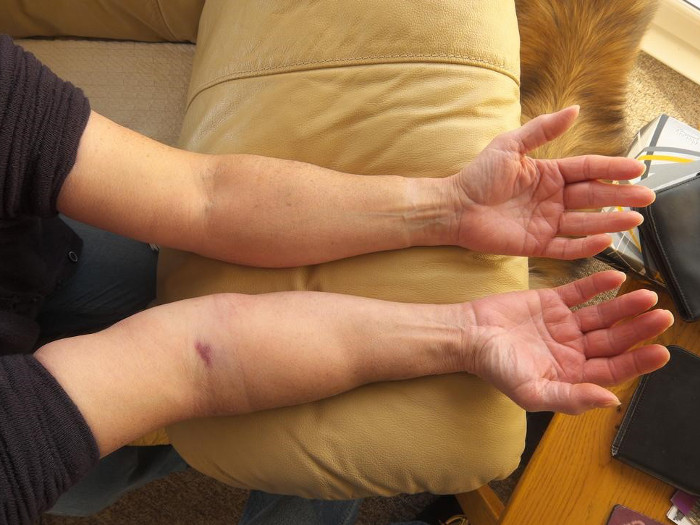Lymphedema — the swelling of one limb or area of the body — affects one in 1,000 Americans, and as many as 200 million people worldwide suffer from lymphedema. While this condition is not curable, talk to your doctor about easy lifestyle changes that can help you better manage your symptoms, including wearing compression hosiery, elevating the affected limb, getting massages and avoiding tight clothing. Not convinced yet? Read on to discover six benefits that come from treating symptoms of lymphedema naturally. [1]
Medically Recommended
Oftentimes, natural remedies for various conditions are seen as alternatives to conventional medical treatments. But when it comes to lymphedema, natural — aka non-pharmaceutical, non-surgical — solutions may be a part of your doctors recommended treatment plan. Pretty much all the strategies that a physician may recommend to treat mild to moderate lymphedema — like wearing compression socks, elevating your legs, and being careful not to injure yourself — are totally natural and proven to help relieve lymphedema symptoms. If you have severe lymphedema, your doctor may recommend surgery, but that’s usually only in the most extreme cases. And in fact, surgery can often act as a trigger for lymphedema. [2]

The doctor-patient relationship is a central part of health care. Photo Credit: Shutterstock
Better Pain Management
Yes, painkillers are a wonderful development of modern medicine, but they’re not the only way to manage your symptoms. Some people prefer not to take medication unless absolutely necessary, while others do take it regularly, and it’s still not enough to address all their lymphedema symptoms. Natural remedies for lymphedema prevention and treatment offer another approach that can be used in place of or in conjunction with pharmaceuticals. Whenever you take medications, you have to watch out for side effects and also double check that your painkillers won’t interact negatively with any other medications you are taking — but these factors are much less of a concern when it comes to natural treatments like exercise and diet.
Better Movement
Once you’ve properly recovered from your illness, surgery or whatever has put you at risk for lymphedema, your doctors will likely recommend exercises to get your lymph fluids moving. These movements should focus on gently contracting the affected limb, enhancing flexibility, stretching and building strength back up to pre-lymphedema levels. With any exercise, you don’t want to overexert yourself too much or strain your muscles, as this can exacerbate lymphedema symptoms. If you need help figuring out a safe exercise routine to combat your lymphedema, seek out a lymphedema therapist in your area.

If your hands are swollen, it is advisable to show them to a doctor as soon as possible. Photo Credit: Shutterstock
Improved Circulation
Many of the strategies to encourage the healthier flow of lymph — wearing loose, breathable clothes, donning compression gear, elevating your legs at the end of the day — also encourage better circulation. This makes sense because your circulatory and lymphatic systems are closely intertwined. In fact, blood vessels actually help carry lymph fluid during part of their cycle. Better circulation has all sorts of benefits, including a stronger heart, lower blood pressure, better cell growth, and organ function, greater nutrient exchanges and more energized muscles. When you take care of your lymphatic system, you’ll also be doing your circulatory system a huge favor.
Improved Quality of Life
The swelling and pain from lymphedema can significantly impede your ability to engage in daily activities, resulting in a reduced quality of life. However, treating lymphedema with these natural remedies can help you regain that quality of life — and even make it better. Losing or managing your weight, elevating your legs, wearing orthopedic shoes, and exercising regularly can improve your health and mobility in ways that go far beyond reducing the swelling and pain of lymphedema — though of course, they’ll do that too.

Cycling can be used for both recreation and exercise. Photo Credit: Shutterstock
Prevention from Surgery
Unfortunately, there is no cure for lymphedema, but it can often be successfully managed using lifestyle changes — to keep your symptoms from progressing to the point where you would need surgery. Surgery is used to treat severe lymphedema when lifestyle changes don’t have enough of an effect. There’s not really a widely-accepted pharmaceutical solution for lymphedema, which is why surgery is often recommended when medical intervention is necessary — although a couple of small pilot studies have shown that ketoprofen, a common anti-inflammatory drug already approved by the FDA, significantly eases swelling and other skin damage from lymphedema. However, if you catch your lymphedema symptoms early enough and manage to keep them in check, you may be able to avoid lymphedema surgery. [3]
Treating lymphedema naturally can help you reduce swelling and manage pain — not to mention it promotes many other healthy lifestyle changes as well. Your lymphatic system and the rest of your body will thank you for your new healthy habits.
